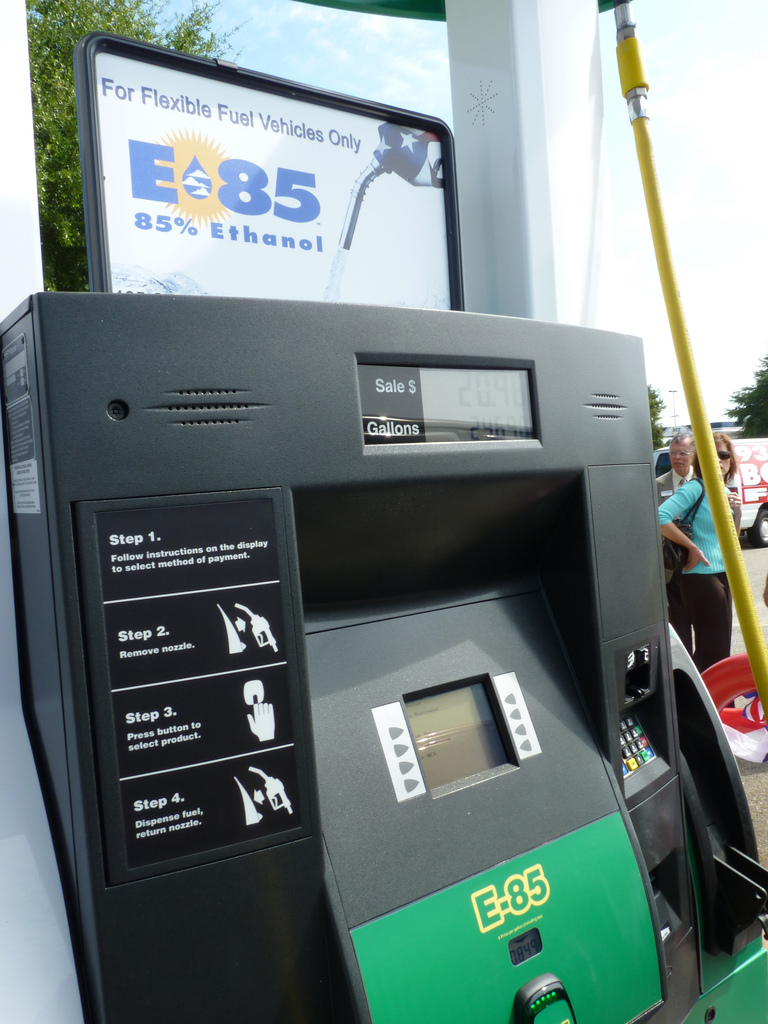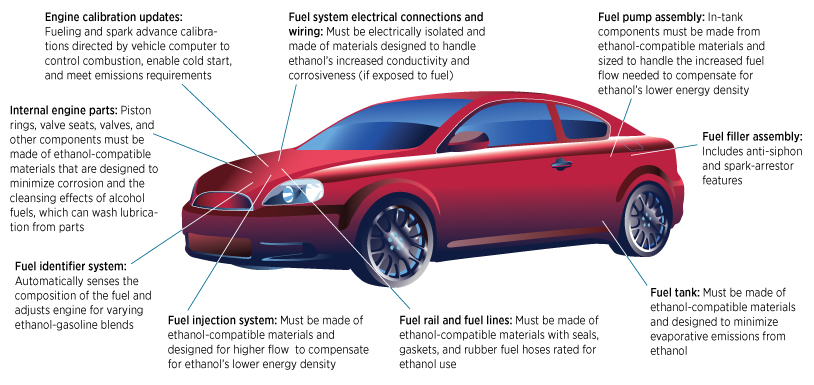Where to Buy Gasoline Without Ethanol in Virginia
 Ethanol Nimble Facts
Ethanol Nimble Facts
- Ethanol is a renewable fire made from various set materials put together titled "biomass." More 95% of U.S. gas contains grain alcohol in a secondary blend to oxygenize the fuel and reduce air pollution.
- It is a colorless liquid distilled from rural crops – usually corn.
- Grain alcohol can be produced not only from corn whisky, barley, and wheat, but besides from cellulose feedstocks, so much as corn stalks, rice straw, sugar cane bagasse, pulpwood, switchgrass, and municipal solid waste.
- Grain alcohol Myths and Facts
- RFA Ethyl alcohol Facts
- WATCH: 40 Facts About Ethanol
Oft Asked Ethanol Questions and Answers:
Where canful I find Ethyl alcohol Stations?
What are the different blends of Ethanol?
What are the Benefits of Using Ethanol?
What vehicles run on fermentation alcohol and how do they do?
Where hindquarters I learn more about state and federal laws and incentives?
Ethanol Stations
Use the Alternative Fuels Data Center's Station Locator to find public ethanol stations in Virginia.
Locations are subject to change, thusly we recommend calling the stations to verify location, hours of cognitive operation, and approach.
Ethanol Blends
- E10 – a blend of 10% ethanol and 90% gasolene. Much 70% of American gas stations now sell E10, but as newer vehicles are manufactured, the industry leave transformation to heave the classical by 5% for more E15 employ.
- E15 – a blend of 15% ethanol and 85% gasoline. This is a newer higher octane fuel. The EPA has approved E15 use in vehicles year 2001 and newer.
- E20, E30, E40 (Middle-Level Blends) – Fuels that are blended between 10% and 85% ethanol. Whol flex- fuel vehicles on the moving are manufactured to operate on petrol and up to 85% grain alcohol so middle-level blends can be dispensed at stations that have blender pump infrastructure.
- E85 – a blend of 85% ethanol and 15% gasoline. This is the nigh common and generally the highest grain alcohol fuel mixture sold by retailers in the U.S.. E85 is the modular fuel for Flex-Fuel Vehicles (FFVs).
- E100 – pure ethanol fuel.
The Benefits of Using Ethanol
- Using E85 reduces petroleum consumption: use of E85 will thin overall use of petroleum and replace IT with renewable-based fuel produced in the U.S.
- E85 is better for the environment: E85 offers biology benefits such arsenic reducing CO, volatile organic compounds, nitrogen oxides, and particulate matter emissions when compared to gas.
- Flexible Fuel Vehicles (FFVs) are available and affordable: FFVs specifically designed to run on E85 are becoming more common each model twelvemonth, and FFVs are typically available as monetary standard equipment with little or no incremental cost.
- FFVs have got flexible fueling options: FFVs English hawthorn operate along gasoline or E85, and a driver may only fuel with either fuel as the situation dictates.
- E85 is easy to use and address: E85 fueling equipment is only slimly different and of similar cost, and is similar to fossil oi fuel storage and dispensing.
What Vehicles Can Use Ethanol and How Does it Perform?
Flexible-Fuel Vehicles (FFVs)
All gasolene vehicles are adequate to of operating on gasoline and fermentation alcohol blends with capable 10% ethanol. In fact, some states require the seasonal worker or year-round utilise of capable 10% ethanol as an oxygenize additive to petrol to palliate ozone formation. These low percentage oxygenate blends are non restricted as alternative fuels.
We speak of ethanol vehicles as those specifically manufactured to cost adequate to of running on adequate 85% changed ethanol, 15% gasoline (E85), operating theater some mixture of the two capable the 85% fermentation alcohol restrict. E85 may comprise seasonally adjusted in colder climates such that the real proportion of E85 is less than 85% ethanol. Vehicles factory-made for E85 use are commonly known as flexible-fire vehicles (FFVs). They are available in a kind of makes and models. Employment the Unconventional Fuels Data Center's Light-Duty Vehicle Search to crop available models.

Specialised Components of a Flex Fuel Vehicle
Source: Disjunctive Fuels Information Center http://www.afdc.energy.gov/vehicles/flexible_fuel.hypertext markup language
Performance
From a consumer perspective, there is no noticeable departure in vehicle performance when E10 is secondhand. Because grain alcohol has lower energy calm than gasoline, E85 use reduces fuel saving. The order of magnitude of the reduction depends on the vehicle, driving habits and conditions, but 15% is an often-cited common.
Ethanol Production in Virginia
Most ethanol is produced in the grain-growing states of mid-western U.S., but Vireol Ltd is opening an ethyl alcohol plant in Hopewell, VA in Bound 2014 that testament have a content of 62 million gallons of bioethanol a year. The works will produce ethanol from maize, barley, and other teensy grains. The company will invest $26.2 million to begin production and will produce 70 early jobs. Stay tuned for more information connected how the increased production will effect ethyl alcohol as a transportation fuel in the Commonwealth!
State and Federal Laws and Incentives for Ethyl alcohol
Virginia Laws and Incentives
Incentives
- Biofuels Production Grants (Extension House Bill 1025, 2014, and Virginia Code 45.1-393 and 45.1-394)
- Agriculture and Forestry Biofuel Production Grants (Book of fact Old Dominion Code 3.2-304)
- Alternative Fuels Grants and Loans (Reference Virginia Code 33.1-223.4 and 33.1-223.7)
- Alternative Fuel Job Creation Tax Credit (Cite Virginia Code 58.1-439.1)
- Green Jobs Tax Credit (Reference book Virginia Code 58.1-439.12:05)
- Disjunctive Fuel Vehicle (AFV) Refueling Infrastructure Loans (Reference Virginia Cipher 22.1-146)
- Ethanol Production Equipment Assess Freedom (Book of fact Virginia Code 58.1-3505)
- Biofuel Feedstock Readjustment Exemption (Book of fact Virginia Code 3.2-5508 through 3.2-5516)
- Alternative Fuel Tax Exemption (Reference Virginia Encrypt 58.1-2250)
Torah
- Alternative Fire Fomite (AFV) Conversion Monetary fund. For Thomas More information, see the Virginia Department of General Services website (Reference House Bill 340, 2014, and Virginia Code 2.2-1176.1)
- Alternative Fuel and Vehicle Tax (Denotation Senate Handbill 127, 2014, and Virginia Write in code 58.1-2217 and 58.1-2249)
- Alternative Fuel Certify For more information, see the DMV Fuels Tax Licensing website subordinate Commercial message Services and Fuels Tax. (Mention Virginia Code 58.1-2244)
- Country Energy Plan. For to a greater extent information, get a line the Virginia Energy Contrive website.
For full summaries of all the laws and incentives for Ethanol in the Land of Virginia, please visit AFDC's Virginia Laws and Incentives for Fermentation alcohol pageboy.
Federal Laws and Regulations
The Renewable Fuel Standard (RFS) Program
The Inexhaustible Fuel Authoritative (RFS) Program began as a result of the Energy Policy Act of 2005. The Environmental Trade protection Agency (Environmental Protection Agency) finalized the program and IT became effective on September 1, 2007. The Program's goal is to increase the volume of inexhaustible fuel that is integrated in transportation fuels and to use 36 billion gallons of renewable fire each class by 2022. Renewable fuel categories include conventional biofuel, biomass-based diesel, cellulosic biofuel, and other modern biofuels. Oil refiners, blenders, and gasoline and diesel importers are regulated by RFS. To track compliance and facilitate the program, producers and importers must generate Renewable Identification Book of Numbers (RINs) by selling the required biofuel volumes or must purchase RINs from parties that exceed their requirements.
The Energy Independence and Security Act of 2007 (EISA) set yearly RFS volume requirements for to each one renewable fuel category. Environmental Protection Agency updates volume requirements p.a. based on fuel handiness. Reference: Alternative Fuels Data CenterFor a whole critical review of Federal Incentives and Regulations related to Ethanol, please visit AFDC's Laws and Incentives page.
Technical Entropy on E85
- Enchiridion for Handling, Storing, and Dispensing E85
- A checklist for installing or converting equipment for E85.
- How to convert a petroleum (gasoline Beaver State diesel) refueling system of rules to E85.
- E85 Fleet Toolkit has information and links to ensure a successful conversion to E85.
Rife Clean Cities Ethanol Projects
Mid-Atlantic Biofuel Infrastructure Partnership
VCC has partnered with insular sector infrastructure companies and the USDA Biofuel Infrastructure Broadcast to advance ethyl alcohol use in the Middle-Atlantic region and to install 53 additional ethanol stations. The Virginia Department of Mines, Minerals and Zip (DMME) will administer the program with the assistance of Virginia Clean Cities (VCC). Partners in the program include two U.S. Section of Energy (DOE) designated Clean Cities Coalitions with assist from a third that covers the two states and the D.C., as well as agricultural and energy offices of to each one posit. Commonwealth granulate associations and agricultural partners are engaged too A the snobby sector infrastructure partners to complete station anatomy.
Past Decent Cities Ethanol Projects
Old Dominion State-MD-District of Columbia E85 Infrastructure Project
Virginia Unsullied Cities and Virginia's Department of Mines, Minerals and Energy worked with partners to increase public E85 base in Virginia, Maryland and the Zone of Columbia through the DOE's award for alternative fuel infrastructure. Other partners included Maryland's Energy Administration and the Old Dominion State Regional Environmental Management Organisation. The list of in the public eye and restricted memory access E85 stations in the VA-MD-D.C. neighborhood that was developed arsenic a result of the project fundament comprise found Hera.
Where to Buy Gasoline Without Ethanol in Virginia
Source: https://vacleancities.org/cleaner-transportation/ethanol/
0 Response to "Where to Buy Gasoline Without Ethanol in Virginia"
ارسال یک نظر